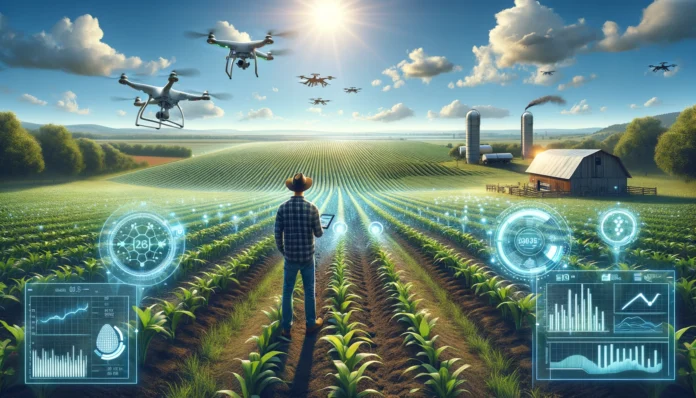In the vast fields of agriculture, innovation has always been the driving force behind progress. From ancient farming techniques to modern mechanization, each era has witnessed advancements aimed at improving efficiency, productivity, and sustainability. In today’s rapidly changing agricultural landscape, one technology stands out as a game-changer: artificial intelligence (AI).
Picture this: a farmer equipped not only with traditional tools but also with sophisticated AI-powered sensors and drones, transforming the way crops are grown and harvested. This fusion of traditional wisdom and cutting-edge technology is ushering in a new era of sustainable agriculture, where every decision is informed by data and insights gleaned from AI algorithms.
At the heart of AI’s impact on sustainable agriculture lies its ability to collect, analyze, and interpret vast amounts of data in real-time. From soil moisture levels to crop health indicators, AI-powered sensors provide farmers with unprecedented visibility into the inner workings of their fields. By harnessing this wealth of information, farmers can make more informed decisions about irrigation, fertilization, and pest management, leading to optimized resource use and reduced environmental impact.
But AI’s influence extends beyond the fields themselves. In the realm of precision agriculture, AI algorithms are revolutionizing the way farms are managed, from planning and planting to harvesting and distribution. By analyzing historical data, weather patterns, and market trends, AI can help farmers optimize crop rotations, predict yields, and even anticipate supply chain disruptions. This proactive approach not only increases productivity but also minimizes waste and ensures a more sustainable food system.
Moreover, AI is empowering farmers to embrace regenerative practices that prioritize soil health and biodiversity. By monitoring soil conditions and crop rotations, AI algorithms can help farmers implement conservation practices that improve soil fertility, reduce erosion, and sequester carbon. These sustainable farming methods not only benefit the environment but also enhance the resilience of agricultural systems in the face of climate change.
In addition to on-the-ground applications, AI is also revolutionizing agricultural research and development. By analyzing genetic data and phenotypic traits, AI algorithms can accelerate the breeding of crop varieties that are more resilient to pests, diseases, and changing environmental conditions. This targeted approach to crop improvement holds the promise of feeding a growing global population while minimizing the ecological footprint of agriculture.
As we look to the future, the potential of AI to transform sustainable agriculture is virtually limitless. From vertical farming and hydroponics to smart irrigation systems and autonomous machinery, AI-powered innovations are reshaping the way we grow, harvest, and distribute food. By harnessing the power of AI, farmers can cultivate healthier crops, conserve natural resources, and build a more resilient food system for generations to come.
In conclusion, AI’s impact on sustainable agriculture is profound and far-reaching. By harnessing the power of data and machine learning algorithms, farmers can optimize resource use, minimize environmental impact, and enhance the resilience of agricultural systems. As we continue to harvest innovation in the fields of agriculture, AI will undoubtedly play a pivotal role in shaping the future of food production and ensuring a more sustainable world for all.





